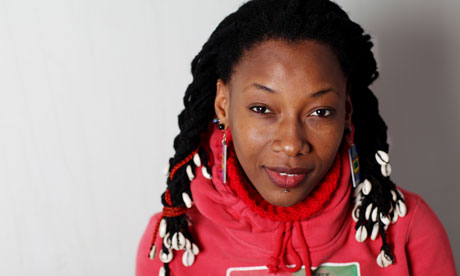It would be easy for someone as in demand as Fatoumata Diawara to forget exactly who she is at times. The 30-year-old singer, who now lives in Paris, was only discovered by British audiences last year, thanks to a string of festival appearances and the release on World Circuit records (home to the likes of the Buena Vista Social Club and the late Ali Farka Touré) of her spellbinding album Fatou. Fans include the DJ Gilles Peterson, who says: "She's one of the most exciting talents I've heard in a long time."
Since then she has gigged relentlessly, written demos for another record, and features prominently on the debut album from Rocket Juice and the Moon, a supergroup involving Damon Albarn, Flea from the Red Hot Chili Peppers and drummer Tony Allen. She's also on Bobby Womack's forthcoming, long-awaited comeback, which has been co-written with Albarn, and on which Diawara sings for the first time in English. "I was really scared," she says when we meet in London, gamely conducting this conversation in English, too. "Damon said, 'You can do it, try!' And then I just started to sing … "
Before then, hers was already an itinerant existence: born to Malian parents in Ivory Coast, one of 11 children, she was sent to live with an aunt in Bamako, the capital of Mali, at the age of nine. A celebrated child actor, she starred in films including Dani Kouyaté's Sia, The Dream of the Python – the legend of a young girl who defies tradition. Real life followed fiction, and against her parents' wishes, at the age of 19, she fled Bamako in the middle of the night to join the famous theatre company Royale de Luxe in France.
Singing, she says now, sipping peppermint tea, "was like a medicine for me … ah! I forget everything." Soon that sensuous, sweet-then-smoky voice had secured her duties as a backing vocalist with acts including Oumou Sangaré, one of Mali's great musical exports. Through that connection she met producer Nick Gold, the wizard responsible for several World Circuit classics.
"I'm lucky to have someone who can keep me who I am," Diawara says. "Nick never says, 'I'm a big producer, I want to change everything, change your personality.' He doesn't say, 'Maybe you can be Beyoncé.'"
Even in the gloom of a hotel bar before a gig at the Jazz Cafe in north London, Diawara exudes the glamour of a real star, which takes us back to the question of who exactly she might be. One theme is clear: she refers consistently to herself as a Malian artist, despite the fact that she wasn't born there, and has no plans for a permanent return.
"Yes, I've only been there quite a short time," she admits, "but I grew up with a Malian mentality." The family spoke Bambara (Mali's lingua franca), as well as the Wassoulou language of the country's south-west, and "every month my father organised traditional music, and dancing. It was like being in Mali."
In fact, Diawara identifies most with her family's ancestral village in the Wassoulou area, despite not speaking the language so well herself. It is difficult, she says, unless she is singing. "It's like in a trance: everything changes. It's as if I was born there."
In the Wassoulou musical tradition, women address issues of childbearing and polygamy, but Diawara's perspective as a half-outsider allows her to tackle yet more sensitive issues, such as female genital mutilation. (On the gentle ballad Boloko, she sings, as it's translated: "If you circumcise girls/ You will make their intimate moments difficult/ They will always have problems with childbirth".)
"You know, we have our mentality but sometimes we do need to think about change, because Mali is a very conservative country," she says. "That is not a bad thing – through music we can slowly change things. And it's easier for me because I'm not living in Mali. If my generation can think a bit about themselves, it's better, especially for girls," she adds, sounding a touch more convincing on the theme of female empowerment than, say, Beyoncé.
Her flight from Mali was triggered by the fear that she would be denied life's opportunities: her mother was a promising singer, but prevented from pursuing any kind of career by Fatou's grandfather – himself a kamel n'goni (a type of traditional harp) player. "I have to do what she lost," she says. "I always wanted to be independent."
It was only last year that she visited the Wassoulou region for the first time, with her Italian husband, Nicolo. She describes an emotional moment. "The women singing: they sounded like me! Every aunt in my village, they sing only for themselves, for weddings, for spiritual reasons – as medicine – and also just for fun. It was beautiful. The melodies are different from jazz, from rock, but the roots are there." And, indeed, to the minds of ethnomusicologists, Wassoulou music is one of the two west African styles that gave birth to the blues and all that followed.
Grounded in this sense of tradition, Diawara feels the freedom to explore new directions. She will feature at any number of festivals this summer, has been nominated for a best newcomer award by Songlines magazine, and of her appearance on the Rocket Juice album (released next week), she smiles: "It's a new experience. You keep your traditional voices, but you can also communicate with a different style: hip-hop, soul, electronic music. You can adapt."
• Fatoumata Diawara will take part in a panel discussion and perform at the Guardian's Open Weekend event this Sunday. Some tickets for each individual session are still available.







